| See Issue Online | Archive |

|
|
November 2013 | Issue 75
|
Forward to a Friend |
Subscribe
|
Dear Reader,
Here we are in November (where did the year go?) and our enewsletter cup runneth over: we have an article from our sister publication PsittaScene
that deals with the complexities of reintroduction of endangered parrots, a question for WPT expert EB Cravens that addresses a Grey Parrot's fear
of bathing, an update from Honduras on another Scarlet Macaw release, WPT-partner Paradise Park's lovely new little additions, and more. And, you'll maybe notice a bit of an African theme this time around...
Happy reading!
Desi Milpacher, Flock Talk editor

In This Issue
Coming Soon...
|
In the coming days you'll hear from a very special supporter of parrots and of the WPT's work.
She has been a passionate advocate for wildlife conservation and has worked for decades to save endangered species...stay tuned for a special message by email and on Twitter and Facebook!
|
Frequently Asked Questions:
Reintroduction Considerations
|
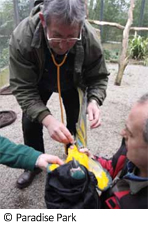
|
Some of what the Trust is doing to save parrots involves reintroductions of individuals into areas where they have been wiped out.
Here Steve Milpacher, WPT Director of Operations, gives us an idea of what is involved in this complex process.
Read the article »
|
Species Profile:
Cape Parrot
|
Genus: Poicephalus
Species: robustus
World Population: Less than 1600
Range:
Endemic to the Republic of South Africa, extending from the Amathole and Transkei regions, to southern KwaZulu-Natal, and an isolated forest in the Limpopo Province.
Ecology:
Found in high altitude Afromontane mistbelt mixed Podocarpus forest patches above 1,400m (4,200ft) and lowland/coastal forest during feeding forays.
Birds feed in trees only, preferring fruits high in the canopy and then moving down. They roost communally in flocks of up to 10 parrots, and travel vast distances (up to 100km)
to preferred feeding sites. Birds are quite shy and easily disturbed when feeding. Prefer Podocarpus fruits, but feed on a variety of seeds from tree species distributed in Afromontane mistbelt forests.
They have also been recorded feeding on exotic food resources such as apples, plums, cherries, acorns, pine seeds, and Eucalyptus flowers.
Threat Summary:
Critically Endangered due to habitat loss, illegal capture for the wild-caught bird trade, and persecution as a crop pest.
IUCN/CITES Rating: Least Concern (Due to being grouped together with its two closest congeners) Appendix I
Learn more about the
Cape Parrot »
|

|
Ask an Expert: A Grey Parrot Afraid to Bathe
By EB Cravens
|
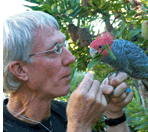
|
A parrot parent concerned with his 7-year old Grey Parrot's fear of bathing, spray-bottles and showers asks WPT expert EB Cravens for guidance.
Read the answer »
|
Paradise Park's Special Chicks
Park Breeds Rare Parrots
|
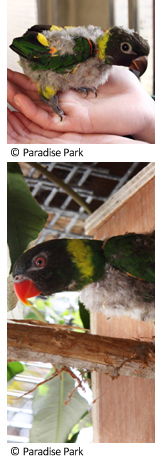 Paradise Park is delighted to announce that they now have a pair of rare Mitchell's Lorikeets on display, and even better, the two have chicks! Hatched September 9, they are now two months old and are growing well, and beginning to feather in the colourful plumage that is the reason for their delightful species name - Rainbow Lorikeet.
Director Alison Hales explains, "We have had them for a little while but they have been in an off-show aviary. Mitchell's Lorikeet is a rare sub-species of the Rainbow Lorikeets and the World Parrot Trust based at Paradise Park has funded some conservation work for them in the wild."
Paradise Park is delighted to announce that they now have a pair of rare Mitchell's Lorikeets on display, and even better, the two have chicks! Hatched September 9, they are now two months old and are growing well, and beginning to feather in the colourful plumage that is the reason for their delightful species name - Rainbow Lorikeet.
Director Alison Hales explains, "We have had them for a little while but they have been in an off-show aviary. Mitchell's Lorikeet is a rare sub-species of the Rainbow Lorikeets and the World Parrot Trust based at Paradise Park has funded some conservation work for them in the wild."
The Mitchell's Lorikeet (Trichoglossus haematodus mitchellii) was historically found only on the Indonesian islands of Lombok and Bali. In recent decades, capture for the pet trade has eliminated all of these birds from the popular tourist island of Bali, and has left populations on Lombok unprotected and very low, possibly with tens to hundreds of individuals remaining on the forested volcanoes there. They continue to be trapped, and sometimes show up in bird markets in Bali. WPT is involved with the conservation of this at-risk lorikeet with Paradise Park, and has our representative, Mehd Halaoaute, at work in Indonesia.
Visit Paradise Park »
More information on Mitchell's Lorikeet »
|
|
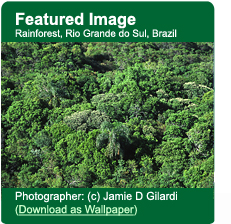



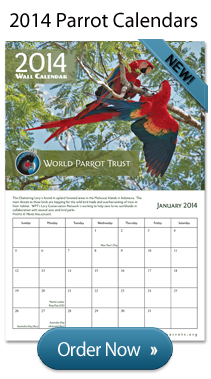
 |  | Test Your Parrot IQ
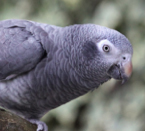
1. This parrot was recently split from its larger cousin and is now a separate species. What is it?
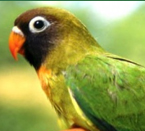
2. This small parrot is Vulnerable in the wild. Name it.
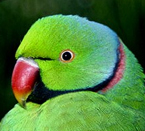
3. This parakeet's population was once down to 12 in the wild. What is it?
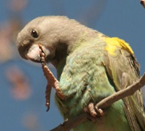
4. This parrot ranges from Central to South Africa. Name it.
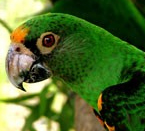
5. This parrot's species name is Poicephalus gulmielmi. What is it?
(Click photos above for
the answers.)
For more information »
Also visit our photostream
at Flickr »
|
 |

|
|
Gift Giving Ideas: Arpilleras
Local Artwork Supports Clay Lick Conservation
|
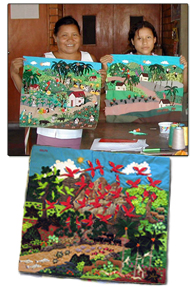 With the season of giving upon us, please consider supporting parrot conservation and sustainable development in the Peruvian Amazon by purchasing a stunning Arpillera.
Arpilleras are hand-sewn wall hangings created by indigenous artisans in Sepahua, Peru. With intricate detail and vivid colours, these unique art pieces depict rainforest, cultural and community themes.
With the season of giving upon us, please consider supporting parrot conservation and sustainable development in the Peruvian Amazon by purchasing a stunning Arpillera.
Arpilleras are hand-sewn wall hangings created by indigenous artisans in Sepahua, Peru. With intricate detail and vivid colours, these unique art pieces depict rainforest, cultural and community themes.
But the most amazing part of the story is that your purchase of these Arpilleras supports the livelihoods of native peoples, who in return protect special clay licks used by parrots -- an arrangement that benefits parrots and humans alike. Learn more about how this special effort is helping to save Amazons, parakeets and more in Peru.
Read the full story (PDF) »
To order, please visit:
USA eStore »
UK/World eStore »
|
Asociación Copan & Macaw Mountain's Recent Success!
WPT partner releases more macaws into the wild
|
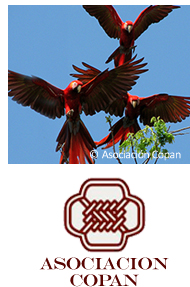 Beginning in 2011, with sponsorship provided by HUGO BOSS - BOSS Orange, WPT, Macaw Mountain Bird Park and Nature Reserve, the Honduran Institute of Anthropology and History (IHAH), and Asociación Copan began an effort to save the Scarlet Macaw, which is threatened by the wild bird trade and habitat loss. Together these organizations launched a plan to return Scarlet Macaws
to the Parque Arqueologico Ruinas De Copan in Honduras.
There have been two releases thus far, with a third that took place in September with Dr. Jamie Gilardi from WPT in attendance, and numerous dignitaries. Six birds were released:
two of them were captive raised, two were rescued from poachers, and the last two were recently rehabilitated, long-term, pet birds. The birds joined the 25 other free flying Scarlets that now call the park home.
Four of the released macaws are doing well; two were taken back to Macaw Mountain as they appeared to be not quite ready for freedom.
Beginning in 2011, with sponsorship provided by HUGO BOSS - BOSS Orange, WPT, Macaw Mountain Bird Park and Nature Reserve, the Honduran Institute of Anthropology and History (IHAH), and Asociación Copan began an effort to save the Scarlet Macaw, which is threatened by the wild bird trade and habitat loss. Together these organizations launched a plan to return Scarlet Macaws
to the Parque Arqueologico Ruinas De Copan in Honduras.
There have been two releases thus far, with a third that took place in September with Dr. Jamie Gilardi from WPT in attendance, and numerous dignitaries. Six birds were released:
two of them were captive raised, two were rescued from poachers, and the last two were recently rehabilitated, long-term, pet birds. The birds joined the 25 other free flying Scarlets that now call the park home.
Four of the released macaws are doing well; two were taken back to Macaw Mountain as they appeared to be not quite ready for freedom.
More excitement for Asociación Copan: the organization was also recently given a prestigious second place in the Premio Nacional del Ambiente XV edicion 2013 for the Guaras en Libertad,
La Belleza Regresa Macaw release program. It is one of the highest national awards, given to individuals and organizations that work to protect the environment. Elizabeth Nutter-Valladares of Asociación
Copan says: "We are very proud of this project and all of those who are participating to make it work!" WPT thanks and congratulates you for your efforts and achievement!
Visit Asociación Copan »
Visit Macaw Mountain »
|
Events and Other Good Things
Creative people supporting parrots
 Madeleine Lenke is supporting parrots in a very special way --
she's running for them! Madeleine has run many a marathon with our logo pinned to her running uniform,
and this month ran in the NYC marathon with 50,000 participants. Later this year in she'll run in Florida, then May 2014 in Stockholm, Sweden.
We thank you Madeleine, and the parrots thank you! Madeleine Lenke is supporting parrots in a very special way --
she's running for them! Madeleine has run many a marathon with our logo pinned to her running uniform,
and this month ran in the NYC marathon with 50,000 participants. Later this year in she'll run in Florida, then May 2014 in Stockholm, Sweden.
We thank you Madeleine, and the parrots thank you!
Wild Parrots Up Close, Venezuela
Enjoy a spectacular parrot watching experience in Venezuela beginning with two weeks in the west followed by two weeks in the east and then a few days along the North Coast.
Join guide Steve Brookes for the whole month or any of the 2 weeks - both trips with very different itineraries to see Rose-crowned Conures as well as many more parrots, some of which are endemic to Venezuela.
There are 50 species of parrots, 103 Hummingbirds, 11 Trogons (of which 4 are Quetzals), 18 Toucans, Toucanets and Aracaris, 28 Woodpeckers and many more birds and mammals.
Date: Nov. 13 - Dec. 12, 2013
Location: Venezuela
Contact: steve@wildparrotsupclose.com
Learn more:
http://www.wildparrotsupclose.com
IAATE 2014
The International Association of Avian Trainers and Educators (IAATE) 22nd annual conference will be held in Dallas, Texas with field trips, workshops, speakers and networking events. IAATE was founded to foster communication, professionalism, and cooperation among those individuals who serve Avian Science through training, public display, research, husbandry, conservation, and education.
Date: February 5 - 8, 2014
Location: Dallas, Texas USA
Learn more:
http://www.iaate.org
Wild Parrots Up Close, Australia
Let Steve Brookes take you on a journey initially to the South west from Perth, on to Tasmania and subsequently the Brisbane area, and not only are 16 species and sub-species of
Cockatoos possible but also several very rare parrots including the Orange-bellied Parrot and Ground Parrot amongst the target of 50 total species and sub-species of Cockatoos and parrots
he is aiming for on this adventure!
Date: Feb. 13 - Mar. 15, 2014
Location: Australia
Contact: steve@wildparrotsupclose.com
Learn more:
http://www.wildparrotsupclose.com
For more event listings, visit the WPT website at:
http://www.parrots.org/index.php/parrotnews/Events/
|
Want to submit a story?
We welcome contributed articles. For more information, please see our writer guidelines or contact us at flocktalk@worldparrottrust.org.
Want to reprint a story?
No material in this publication may be reproduced without permission from the World Parrot Trust. To request permission contact us at flocktalk@worldparrottrust.org.
Comments?
Please contact us at flocktalk@worldparrottrust.org.
Remember to add flocktalk@worldparrottrust.org to your address book or safe senders list.
|
|
Update your profile |
Forward to a friend |
Unsubscribe
WPT Online | Donate | Shop |
Privacy Policy | Disclaimer | Contact | About
|
|
© 2013 The World Parrot Trust | Glanmor House Hayle, Cornwall TR27 4HB
|
|



|
|








 Paradise Park is delighted to announce that they now have a pair of rare Mitchell's Lorikeets on display, and even better, the two have chicks! Hatched September 9, they are now two months old and are growing well, and beginning to feather in the colourful plumage that is the reason for their delightful species name - Rainbow Lorikeet.
Director Alison Hales explains, "We have had them for a little while but they have been in an off-show aviary. Mitchell's Lorikeet is a rare sub-species of the Rainbow Lorikeets and the World Parrot Trust based at Paradise Park has funded some conservation work for them in the wild."
Paradise Park is delighted to announce that they now have a pair of rare Mitchell's Lorikeets on display, and even better, the two have chicks! Hatched September 9, they are now two months old and are growing well, and beginning to feather in the colourful plumage that is the reason for their delightful species name - Rainbow Lorikeet.
Director Alison Hales explains, "We have had them for a little while but they have been in an off-show aviary. Mitchell's Lorikeet is a rare sub-species of the Rainbow Lorikeets and the World Parrot Trust based at Paradise Park has funded some conservation work for them in the wild."










 With the season of giving upon us, please consider supporting parrot conservation and sustainable development in the Peruvian Amazon by purchasing a stunning Arpillera.
Arpilleras are hand-sewn wall hangings created by indigenous artisans in Sepahua, Peru. With intricate detail and vivid colours, these unique art pieces depict rainforest, cultural and community themes.
With the season of giving upon us, please consider supporting parrot conservation and sustainable development in the Peruvian Amazon by purchasing a stunning Arpillera.
Arpilleras are hand-sewn wall hangings created by indigenous artisans in Sepahua, Peru. With intricate detail and vivid colours, these unique art pieces depict rainforest, cultural and community themes. 
 Madeleine Lenke is supporting parrots in a very special way --
she's running for them! Madeleine has run many a marathon with our logo pinned to her running uniform,
and this month ran in the NYC marathon with 50,000 participants. Later this year in she'll run in Florida, then May 2014 in Stockholm, Sweden.
We thank you Madeleine, and the parrots thank you!
Madeleine Lenke is supporting parrots in a very special way --
she's running for them! Madeleine has run many a marathon with our logo pinned to her running uniform,
and this month ran in the NYC marathon with 50,000 participants. Later this year in she'll run in Florida, then May 2014 in Stockholm, Sweden.
We thank you Madeleine, and the parrots thank you!